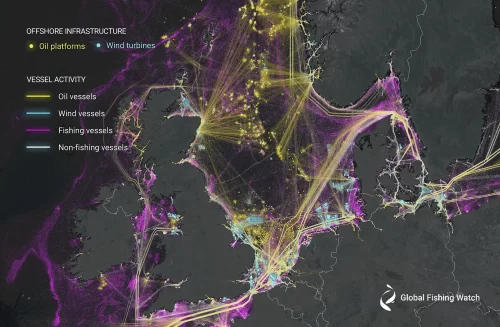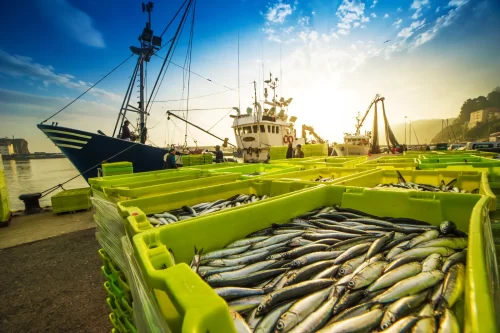xVIEW3’s leader board has been heating up with potential computer vision solutions to detect dark vessels to help shine a light on illegal, unreported and unregulated (IUU) fishing activity
Washington, D.C. — Close to 900 participants have begun to submit algorithms that could help transform our ability to rapidly identify potential IUU fishing activity and more effectively target enforcement efforts on the water.
“In the Pacific Ocean, there’s nearly 64 million square miles of sea, and that vast open ocean is one of our biggest challenges in identifying and preventing illegal, unreported and unregulated (IUU) fishing,” said Lt. Cmdr. Kristen Caldwell, U.S Coast Guard, Pacific Area Living Marine Resources Program Manager. “AI programs and digital tools that come from efforts like the XView3 competition are vital to the Coast Guard’s targeted, effective, intelligence-driven enforcement operations. These algorithms will help ensure that the Coast Guard and our partners have the tools we need to keep a watchful eye on our oceans and ensure that the world’s oceans are protected from overfishing.”
The xView3 Challenge is a global call for skilled developers to harness satellite-based synthetic aperture radar (SAR) data to detect dark vessels.
The $150,000 prize purse for this Challenge is provided by the Defense Innovation (DIU) and Global Fishing Watch (GFW), and will be awarded to U.S. and international participants (individuals and companies) with the best performing algorithms. Winning machine learning algorithms must be able to automatically detect and characterize dark vessels—vessels that do not publicly broadcast their location or appear in public monitoring systems—in these SAR images. SAR technology can penetrate clouds and darkness to reveal these dark vessels’ location and activity.
“Currently, submitted algorithms are already doing substantially better than a standard Faster-RCN baseline—a neural network for object detection—but improved performance means putting a floodlight on the location of the worst offenders of illegal fishing,” said Jared Dunnmon, technical director with the Defense Innovation Unit. “This is an international problem, and by leveraging computer vision and the latest overhead imagery, we can better partner together to defeat this problem.”
IUU fishing is a major threat to human food supply, marine ecosystem health, and geopolitical stability. The effects of this exploitation are extensive: coastal environments and social systems are destabilized and maritime developing countries suffer acute economic losses, creating conditions for increased crime and human rights abuses. Moreover, IUU fishing exacerbates the impact of climate change and increases the likelihood of military conflict over scarce ocean resources.
The xView 3 Challenge closes on November 30, 2021. To register, read more about the challenge, download the data, and check out the leaderboard, visit https://iuu.xview.us/
To learn more about the computer vision competitions that advance, benchmark, and procure state of the art machine learning algorithms in domains relevant to national security, visit DIU’s xView Challenge Series webpage.

